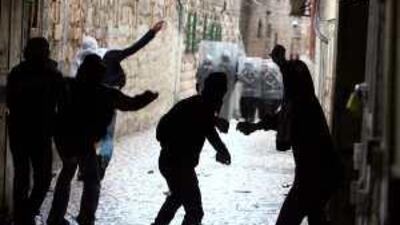RAMALLAH // Violence erupted at the Al Aqsa Mosque in Jerusalem yesterday when Israeli police stormed the compound to confront stone-throwing protesters. Seven Palestinians were arrested and dozens of protesters were injured, along with four policemen, when police tried to tackle some 20 Palestinians who had chased out a group of non-Muslims they suspected of being extremist Jews intent on damaging Al Aqsa compound.
Israeli police would only say that the non-Muslims were "tourists". But Adnan Husseini, an official at Al Aqsa compound, said the clashes had erupted in response to threats from extremist settler groups and rejected that ordinary tourists were involved. The UAE's Foreign Ministry condemned "brutal attacks and dangerous violations by Israeli settlers and occupation forces". An order was issued barring anyone under 50 and without a blue Israeli ID from entering the mosque.
Palestinians had gathered at the site overnight to prevent extremists from entering for the Jewish holiday of Purim. Tourists are allowed into the mosque at certain hours during the day every day except Fridays. One of the demonstrators inside the compound said he had responded to a call from the mosque to defend it. "I heard the call to prayer at a time when it was not scheduled, a signal to all Muslims to come and defend the mosque," said the man, who would only give his first name, Hussein. "Then police came and started firing rubber bullets and sound grenades."
Protesters took cover inside the mosque and police eventually withdrew. But sporadic clashes broke out elsewhere in Jerusalem's Old City, and tensions remained high and are likely to do so until tomorrow, when the Purim holiday officially ends. Al Aqsa compound, the third holiest site in Islam, has been a flashpoint for violence in the past. In October, 30 Palestinians were injured and 20 detained after similar clashes in response to apparent threats from extremist Jewish groups to enter the mosque compound.
The second intifada, also known as the Aqsa intifada, broke out in September 2000 after Ariel Sharon, who was then the Israeli opposition leader, visited the compound with a 1,000-strong security detail in a public gesture to indicate Israeli sovereignty over the site. The compound is in territory Israel occupied in 1967, and Israeli politicians of all stripes consider Jerusalem the "eternal, undivided capital of Israel".
The compound, from where the Prophet Mohammed is believed to have ascended to heaven, is considered by Jews to be the site of the Second Temple, which was destroyed by the Romans in 70AD. Although most religious Jews consider it forbidden to walk there, some groups have advocated that it should also be the site of a new third temple, which would necessitate the destruction of the existing compound.
There have been a number of attempts in the past to destroy the mosque, most notably in 1969, when an Australian Christian attempted to set fire to the compound. According to some Christian theology, the rebuilding of the Jewish temple is necessary to fulfil biblical prophesies of the end of days. The clashes at Al Aqsa come amid growing tensions across the West Bank where the Israeli decision to list sites in Hebron and Bethlehem among "Israeli national heritage sites" has caused uproar.
The past week has seen clashes erupt, particularly in Hebron and near the Ibrahimi mosque, one of the two sites in question, in protest against the Israeli decision, announced on February 21. Thursday, moreover, marked 16 years since an Israeli-American army doctor, Baruch Goldstein, entered the mosque and killed 29 Muslims at prayer, a massacre that led to the current separation of the mosque into Jewish and Muslim sections.
At the demonstrations commemorating the massacre, Mohammad Barakeh, an Israeli parliamentarian, said Israel's decision to list the Ibrahimi mosque on a list of its own heritage sites was part of an effort to inflame an already volatile situation. Benjamin Netanyahu, the Israeli prime minister, "is an expert at lighting fires. The Netanyahu-Barak government is pushing towards a regional explosion," Mr Barakeh said.
Yesterday, from inside the Aqsa compound, similar sentiments were heard. "Israel wants to provoke more violence," Hussein said. "And if it continues attacking our religious sites, this will happen." okarmi@thenational.ae

